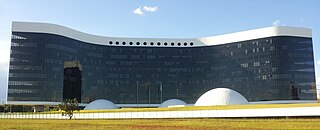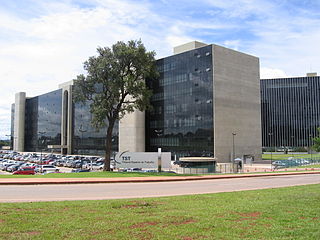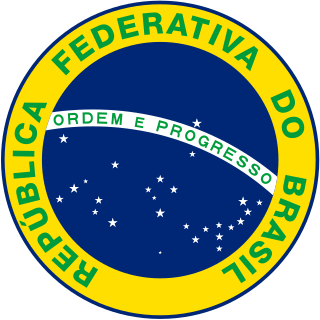The federal court system of Brazil has all its organs and competences listed and defined in the Brazilian 1988 Constitution. The National Justice Council is an exclusively administrative organ of the federal court system.

The politics of Brazil take place in a framework of a federal presidential representative democratic republic, whereby the President is both head of state and head of government, and of a multi-party system. The political and administrative organization of Brazil comprises the federal government, the 26 states and a federal district, and the municipalities.

A tribunal, generally, is any person or institution with authority to judge, adjudicate on, or determine claims or disputes—whether or not it is called a tribunal in its title. For example, an advocate who appears before a court with a single judge could describe that judge as "their tribunal." Many governmental bodies that are titled as "tribunals" are described so in order to emphasize that they are not courts of normal jurisdiction. For example, the International Criminal Tribunal for Rwanda was a body specially constituted under international law; in Great Britain, employment tribunals are bodies set up to hear specific employment disputes. In many cases, the word tribunal implies a judicial body with a lesser degree of formality than a court, in which the normal rules of evidence and procedure may not apply, and whose presiding officers are frequently neither judges, nor magistrates. Private judicial bodies are also often styled "tribunals." The word tribunal, however, is not conclusive of a body's function—for example, in Great Britain, the Employment Appeal Tribunal is a superior court of record.
The government of Czechoslovakia under Marxism–Leninism was in theory a dictatorship of the proletariat. In practice, it was a one-party dictatorship run by the Communist Party of Czechoslovakia, the KSC.

The Judiciary of Russia interprets and applies the law of Russia. It is defined under the Constitution and law with a hierarchical structure with the Constitutional Court and Supreme Court at the apex. The district courts are the primary criminal trial courts, and the regional courts are the primary appellate courts. The judiciary is governed by the All-Russian Congress of Judges and its Council of Judges, and its management is aided by the Judicial Department of the Supreme Court, the Judicial Qualification Collegia, and the Ministry of Justice, and the various courts' chairpersons. And although there are many officers of the court, including jurors, the Prosecutor General remains the most powerful component of the Russian judicial system.

The law of Brazil is based on statutes and, partly and more recently, a mechanism called súmulas vinculantes. It derives mainly from the civil law systems of European countries, particularly Portugal, the Napoleonic Code and the Germanic law.

The Superior Electoral Court is the highest body of the Brazilian Electoral Justice, which also comprises one Regional Electoral Court in each of the 26 states and the Federal District of the country, as determined by the Article 118 of the Constitution of Brazil.

A supreme court is the highest court within the hierarchy of courts in most legal jurisdictions. Other descriptions for such courts include court of last resort, apex court, and highcourt of appeal. Broadly speaking, the decisions of a supreme court are not subject to further review by any other court. Supreme courts typically function primarily as appellate courts, hearing appeals from decisions of lower trial courts, or from intermediate-level appellate courts.

The judiciary of Portugal is a system of courts that together constitute one of the four organs of Sovereignty as defined by the Portuguese Constitution. The courts are independent from the other three Portuguese organs of Sovereignty.
The order of precedence in Brazil is a symbolic hierarchy of officials used to direct protocol. It is regulated by Presidential Decree number 70.274 of March 9, 1972, signed by former President Emilio Medici. The following order applies to ceremonies hosted by the federal government.

The Superior Court of Justice is the highest appellate court in Brazil for non-constitutional questions of federal law. The STJ also has original jurisdiction over some cases. Its competence is described in Article 105 of the Brazilian Constitution of 1988.

The Public Prosecutor's Office is the Brazilian body of independent public prosecutors at both the federal and state level. It operates independently from the three branches of government. It was once referred by constitutional lawyer and former president Michel Temer as a "Fourth Branch". The Constitution of 1988 divides the functions of the Public Prosecutor's Office into three different bodies: the Public Procurator's Office, the Public Defender's Office and the Public Prosecutor's Office itself, each one of them an independent body. In addition to that, the new Constitution created the Courts of Account, also autonomous in its functions.

Desembargador is a Portuguese title given to some appellate judges in Portugal, Brazil and other countries influenced by the Portuguese legal tradition.

The following outline is provided as an overview of and topical guide to Brazil:

The judiciary of the Republic of Chile includes one Supreme Court, one Constitutional Court, 16 Courts of Appeal, 84 Oral Criminal Tribunals and Guarantee Judges; 7 Military Tribunals; over 300 Local Police Courts; and many other specialized Tribunals and courts in matter of family, labor, customs, taxes, electoral affairs, etc.

The Superior Labor Court or Tribunal Superior do Trabalho (TST), in Portuguese, is the highest Brazilian appellate court for labor law issues. Its headquarters are located in Brasilia, near the American Embassy.

The Judiciary of Brazil is the group of public entities designated by the Brazilian constitution to carry out the country's judicial functions.

The Federal Government of Brazil is the national government of the Federative Republic of Brazil, a republic in South America divided in 26 states and a federal district. The Brazilian federal government is divided in three branches: the executive, which is headed by the President and the cabinet; the legislative, whose powers are vested by the Constitution in the National Congress; and the judiciary, whose powers are vested in the Supreme Federal Court and lower federal courts. The seat of the federal government is located in Brasília.

The Brazilian Election Justice was created by Decree No. 21,076 of 24 February 1932, representing one of the innovations of the Brazilian Revolution of 1930. In 1932 there was the first edited Brazilian Election Code, inspired by the Election Justice of the Czech Republic and the ideas of Joaquim Francisco de Assis Brasil, a politician, farmer and ambassador
General elections will be held in Brazil on 4 October 2026 to elect the president, vice president, members of the National Congress, the governors, vice governors, and legislative assemblies of all federative units, and the district council of Fernando de Noronha. If no candidate for president—or for governor in some states—received more than half of the valid votes in the first round, a runoff election for these offices will be held on 31 October.